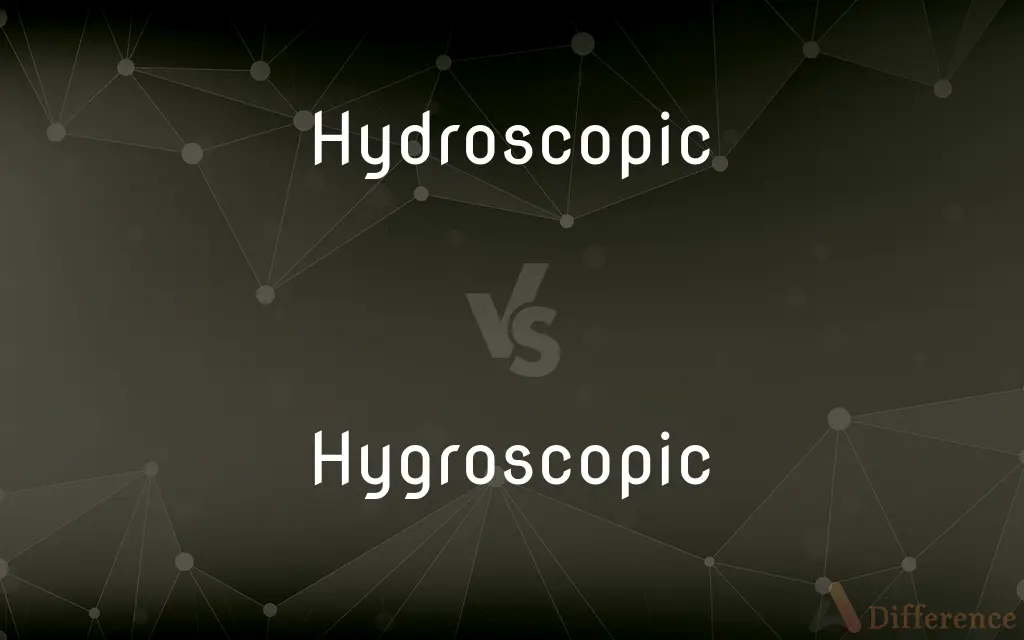Hydroscopic vs. Hygroscopic — What's the Difference?
Edited by Tayyaba Rehman — By Fiza Rafique — Published on December 4, 2023
"Hygroscopic" refers to the ability to absorb moisture from the air, while "Hydroscopic" is an incorrect term often confused with "Hygroscopic."

Difference Between Hydroscopic and Hygroscopic
Table of Contents
ADVERTISEMENT
Key Differences
"Hygroscopic" and "Hydroscopic" are two terms that can easily be confused due to their phonetic similarities. However, only "Hygroscopic" is the scientifically accepted term, denoting a substance's ability to attract and hold water molecules from the surrounding environment. This property is vital in many industrial and scientific applications, such as in the storage of certain chemicals or the design of humidity-sensitive equipment.
On the contrary, "Hydroscopic" is not a recognized term in scientific lexicons. It's often a mispronunciation or misspelling of "Hygroscopic." The prefix "Hygro-" comes from the Greek word for moisture, making "Hygroscopic" a term inherently about moisture absorption. Thus, using "Hydroscopic" instead of "Hygroscopic" is a mistake that can lead to misunderstandings, especially in contexts where the precise meaning is crucial.
It's essential to be vigilant about the correct usage of these terms, especially in professional or academic contexts. "Hygroscopic" is a property observed in substances like salts, which can readily absorb water from the air, making them crucial in processes such as humidity control. The term's significance in science and industry underscores the importance of using it correctly.
Conversely, it's vital to understand that "Hydroscopic" doesn't hold any scientific meaning. When encountered, it's generally safe to assume the intended term was "Hygroscopic." Ensuring clarity in communication, particularly in scientific contexts, is paramount, and recognizing the distinction between these terms is a step in that direction.
In summary, while "Hygroscopic" is a meaningful term denoting moisture absorption, "Hydroscopic" is essentially a misnomer. Being aware of this distinction ensures accurate and effective communication, especially in fields where such terminologies are commonplace.
ADVERTISEMENT
Comparison Chart
Meaning
Commonly a misspelling/mispronunciation
Refers to the ability to absorb moisture from the air
Prefix Origin
"Hydro-" refers to water
"Hygro-" comes from the Greek word for moisture
Scientific Relevance
Not a recognized scientific term
Used in various scientific contexts
Usage
Incorrect usage
Correct term to describe moisture-absorbing ability
Compare with Definitions
Hydroscopic
Often mistaken for "Hygroscopic."
Many people incorrectly say Hydroscopic when discussing salts.
Hygroscopic
Inherently about moisture absorption due to the "Hygro-" prefix.
The hygroscopic nature of some compounds makes them useful in humidity control.
Hydroscopic
An erroneous term confused with the ability to absorb water.
She thought the sugar was hydroscopic, but the correct term is hygroscopic.
Hygroscopic
Relating to the absorption of water molecules from the surrounding environment.
Certain chemicals have hygroscopic properties and need to be stored carefully.
Hydroscopic
Not a scientifically recognized term.
The student realized Hydroscopic wasn't in the science textbook.
Hygroscopic
Pertaining to a substance's ability to attract and retain moisture.
Salt is highly hygroscopic, which is why it clumps in humid conditions.
Hydroscopic
A common misspelling of the term denoting moisture absorption.
He wrote Hydroscopic in his paper, but his professor corrected it.
Hygroscopic
Denoting materials that can draw moisture from the air.
Rice is sometimes used as a hygroscopic agent to keep products dry.
Hydroscopic
Mistakenly used in place of "Hygroscopic."
The label said Hydroscopic properties, but it was a typo.
Hygroscopic
A property observed in substances that readily absorb water.
The hygroscopic behavior of desiccants is essential for preserving certain goods.
Hydroscopic
An optical device used for viewing objects far below the surface of water.
Hygroscopic
Readily absorbing moisture, as from the atmosphere.
Hydroscopic
Misspelling of hygroscopic
Hygroscopic
Readily taking up and retaining water, especially from the atmosphere.
Hygroscopic
Of or pertaining to, or indicated by, the hygroscope; not readily manifest to the senses, but capable of detection by the hygroscope; as, glass is often covered with a film of hygroscopic moisture.
Hygroscopic
Having the property of readily inbibing moisture from the atmosphere, or of the becoming coated with a thin film of moisture, as glass, etc.
Hygroscopic
Absorbing moisture (as from the air)
Common Curiosities
Why do people mistakenly say "Hydroscopic"?
It's likely due to the phonetic similarity and confusion with "Hydro-" which means water.
Why is it crucial to distinguish between the two terms?
Using "Hygroscopic" accurately ensures clear communication, especially in scientific contexts.
Are all salts hygroscopic?
Many salts are hygroscopic, but not all to the same degree.
Are there tools to measure a substance's hygroscopic property?
Yes, tools like hygrometers or gravimetric analysis can measure hygroscopic properties.
Can I use "Hydroscopic" in my research paper?
It's advisable to use "Hygroscopic" for clarity and accuracy.
How do I remember the correct term?
Remember "Hygro-" comes from the Greek word for moisture.
Do hygroscopic materials always remain wet?
No, they can absorb moisture without necessarily feeling wet.
Is "Hydroscopic" a scientifically recognized term?
No, "Hydroscopic" is not recognized; the correct term is "Hygroscopic."
What does "Hygroscopic" mean?
"Hygroscopic" refers to the ability of a substance to absorb moisture from the air.
Why is understanding hygroscopic properties important?
It's vital in various fields, from preserving goods to designing equipment sensitive to humidity.
Can a material be both hydrophobic and hygroscopic?
It's rare, as these properties are generally opposing.
Is "Hygroscopic" related to humidity?
Yes, hygroscopic substances can absorb or attract moisture from the air, influencing humidity.
Is "Hydroscopic" an older term for "Hygroscopic"?
No, "Hydroscopic" has always been a mispronunciation or misspelling of "Hygroscopic."
Does the term "Hygroscopic" only apply to solids?
While commonly associated with solids, liquids can also exhibit hygroscopic properties.
Are there substances that are opposite to hygroscopic?
Yes, hydrophobic substances repel water.
Share Your Discovery

Previous Comparison
Kosher Salt vs. Coarse Salt
Next Comparison
Varchar vs. NvarcharAuthor Spotlight
Written by
Fiza RafiqueFiza Rafique is a skilled content writer at AskDifference.com, where she meticulously refines and enhances written pieces. Drawing from her vast editorial expertise, Fiza ensures clarity, accuracy, and precision in every article. Passionate about language, she continually seeks to elevate the quality of content for readers worldwide.
Edited by
Tayyaba RehmanTayyaba Rehman is a distinguished writer, currently serving as a primary contributor to askdifference.com. As a researcher in semantics and etymology, Tayyaba's passion for the complexity of languages and their distinctions has found a perfect home on the platform. Tayyaba delves into the intricacies of language, distinguishing between commonly confused words and phrases, thereby providing clarity for readers worldwide.
















































